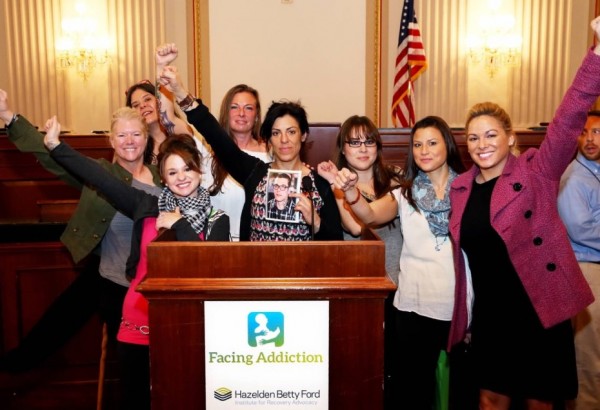Alaska’s capital city is battling addiction. The Juneau community continues to face substance-related deaths and near deaths.
Three women tell their stories about addiction, long-term recovery and a rally that gave them hope.

Christina Love, Kara Nelson and Julee Douglas are all in recovery. At different times in their lives, they’ve been addicted to different substances.
Love is an advocate at the AWARE shelter in Juneau. She said her addiction started out with Adderall in college. Cocaine was next.
“Then we went to crack cocaine, and alcohol is always there. The hangovers were bad, so we went to pills, then we went to oxys, and then we went to heroine, and then benzos. And really it’s anything that’s in front of you at any given point,” Love said.
Love detoxed in Fairbanks and became sober. Then she started treatment and is in long-term recovery.
“Once you have this disease, you suffer it for the rest of your life, and it can’t be stopped,” Love said. “But it can be arrested.”
Love and Kara Nelson met on the recovery journey about four years ago. They’d been anonymous in meetings held in churches and basements before they started speaking and advocating publicly.
Last month, they and six other women from Juneau and Anchorage represented Alaska in the UNITE to Face Addiction Rally in Washington, D.C. They marched in the National Mall with close to 30,000 people involved in the recovery movement, including other recovering addicts and those who’ve lost people to addiction.
Nelson is the director of Haven House, a faith-based transitional home for women recently paroled or released from prison. Haven House provides peer-to-peer support for women who’ve faced addiction and incarceration. She organized the trip to D.C.
“As a person in long-term recovery and as someone who has an extensive history in our criminal justice system and continuously sees my friends, our neighbors, our people incarcerated and then the effects of that and then getting out and having even more issues than being in prison itself, this was a very personal thing for myself to be a part of,” Nelson said.
The rally was aimed at changing the conversation around addiction and treating it as a health crisis. Nelson said recovery is a lifelong journey, not aftercare for a month.
“If you have any other kind of illness or disease, you’re going to have these check-ups and you’re going to continuously be checking in to every symptom, right? That’s exactly how substance use and mental health should be treated as well,” she said.
At one of the rally events, people wore T-shirts and carried posters with photos of loved ones who had passed away from addiction. Julee Douglas said being surrounded by that helped her and the others come to terms with the wreckage of their past.
“Any one of us could have been a poster or a T-shirt for sure,” Douglas said.
Douglas also works at Haven House as the house manager. She said offering peer support to the residents gives her support to heal from her alcohol addiction.
During the rally, the group visited Alaska’s congressional delegation to lobby for bills related to the recovery movement, like theComprehensive Addiction and Recovery Act. The CARA bill will help bring money to grassroots recovery organizations.
Love said it was empowering to be at the D.C. rally and advocate with people who share experiences of feeling rejected, discriminated against and suicidal.
“I’ve said a million times over and over, ‘I’m a person in long-term recovery.’ That’s one of my favorite things about myself and it’s one of my favorite things about the people that I help because it stands for something so completely opposite from what the rest of the world thinks,” Love said. “They see an addict, but I see a person who’s resilient and a fighter.”
Nelson helped form the Juneau Recover Community two years ago. It’s people in recovery helping others through support and social events, like Recovery Fest. But she says more needs to be done.
“We’ve been able to educate ourselves to really be in a position where we are the ones that are the solution.”
Nelson and Love, both recovery coaches, plan to work with local agencies to form a community plan focused on recovery, and are actively meeting with Juneau organizations to try to establish a detox facility.
Lisa Phu is a reporter at KTOO in Juneau.




